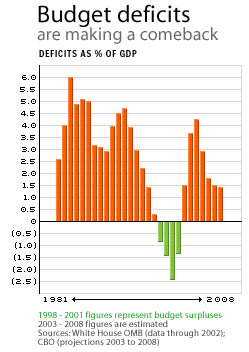NEW YORK (CNN/Money) -
Congressional analysts say the federal budget deficit will soar to record levels in coming years, but some analysts said Wednesday they're probably being too optimistic -- deficits could be much worse than expected.
This week, the Congressional Budget Office (CBO) projected deficits of $401 billion in 2003 and $480 billion in 2004, both the widest deficits in dollar terms in the nation's history -- though still relatively low as a percentage of gross domestic product (GDP), the broadest measure of the entire economy.

The CBO also said it expects deficits from 2004 to 2008 to total $1.44 trillion, easily the worst five-year period in history. But the group, the non-partisan research arm of Congress, also assumes that deficits will gradually shrink, turning again to surpluses by the year 2012.
But economists at UBS Warburg, BNP Paribas said in separate research notes Wednesday that the CBO could be underestimating the true size of the deficits, since they don't take into account some pricey policy measures still in the pipeline.
"This forecast unrealistically assumes that discretionary spending will grow only with inflation, that all expiring tax breaks will expire on schedule -- they almost never do -- and that Congress will not enact the prescription drug benefit for Medicare that a House-Senate conference is now debating," UBS Warburg economist Susan Hering wrote.
Assuming instead that government spending on defense, education, health and transportation programs grows at a pace consistent with economic growth, that the tax cuts enacted this year are made permanent -- as President Bush would like -- and that a prescription drug benefit is passed, deficits will be at or near $500 billion a year at least through 2010, according to CBO figures.
In that case, the 2004-2008 total deficit projection jumps from a measly $1.44 trillion to $2.3 trillion.
| Related stories
|

|
|
|
|
Even more alarmingly, the 2004-2013 total deficit projection jumps from $1.4 trillion -- the CBO's estimate includes surpluses in 2012 and 2013 -- to a whopping $4.75 trillion.
That estimate might be too optimistic, if discretionary spending grows at 7.7 percent a year, its average pace from 1998 to 2003, according to BNP Paribas economist Alexandria Estiot.
At that pace, if the tax cuts are made permanent and a prescription drug plan is passed, the 2004-2008 deficit projection jumps to $2.6 trillion, and the 2004-2013 deficit projection surges to $6.2 trillion.
The size of the deficit could be critical to the broader economy, according to some economists, who worry it could force interest rates ever higher, raising the cost of borrowing and slowing down growth.
This fear is based on the theory that government debt will "crowd out" private borrowing and that interest rates will have to rise to make bonds and notes more attractive to investors.
"The path of large and permanent deficits on which the government has embarked is unsound public policy and should be reversed as soon as the economy permits," Richard Kogan, a senior fellow at the Center on Budget and Policy Priorities, a Washington think tank, wrote in a study late Tuesday that also accused the CBO of being overly optimistic.
Many economists hotly dispute the "crowding out" theory, however, and Hering warned that any budget projections beyond two years should be taken with a grain of salt anyway, since they have a tendency to be wildly wrong.
"The fact of the matter is, the economy moves in strange ways, and politicians move in even stranger ways," Hering told CNN/Money.

|

